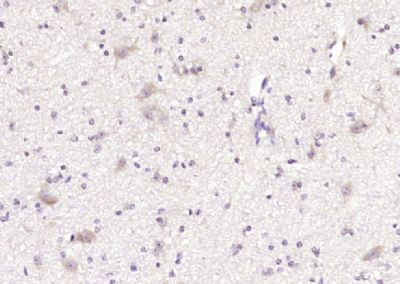产品货号 : mlR11704
英文名称 : AFG3L2
中文名称 : AFG3样蛋白2/脊髓小脑共济失调蛋白28抗体
别 名 : SCA28; AFG3 (ATPase family gene 3, yeast) like 2; AFG3 ATPase family gene 3 like 2 (yeast); AFG3 ATPase family gene 3 like 2; AFG3 like protein 2; ATPase family gene 3 like 2; ATPase family gene 3 yeast; FLJ25993; Paraplegin like protein; SCA28; Spinocerebellar ataxia 28; AFG32_HUMAN .
研究领域 : 肿瘤 细胞生物 神经生物学 信号转导 泛素
抗体来源 : Rabbit
克隆类型 : Polyclonal
交叉反应 : Human, Mouse, Rat, Chicken, Dog, Pig, Cow, Horse, Sheep,
产品应用 : ELISA=1:500-1000 IHC-P=1:400-800 IHC-F=1:400-800 ICC=1:100-500 IF=1:100-500 (石蜡切片需做抗原修复)
not yet tested in other applications.
optimal dilutions/concentrations should be determined by the end user.
分 子 量 : 89kDa
细胞定位 : 细胞膜
性 状 : Lyophilized or Liquid
浓 度 : 1mg/ml
免 疫 原 : KLH conjugated synthetic peptide derived from human AFG3L2:531-600/797
亚 型 : IgG
纯化方法 : affinity purified by Protein A
储 存 液 : 0.01M TBS(pH7.4) with 1% BSA, 0.03% Proclin300 and 50% Glycerol.
保存条件 : Store at -20 °C for one year. Avoid repeated freeze/thaw cycles. The lyophilized antibody is stable at room temperature for at least one month and for greater than a year when kept at -20°C. When reconstituted in sterile pH 7.4 0.01M PBS or diluent of antibody the antibody is stable for at least two weeks at 2-4 °C.
PubMed : PubMed
产品介绍 : AFG3L2 is a multi-pass membrane metalloprotease that contains one AAA (ATPase associated with diverse cellular activities) domain, a zinc-dependent binding motif, an RNA-binding region and an ATP/GTP binding site. Localizing to the mitochondrial membrane, AFG3L2 is ubiquitously expressed with highest expression levels in skeletal muscle and heart. AFG3L2 shares 69% similarity with the yeast Afg3 protein and 49% similarity with Paraplegin, a protein of mitochondria that is thought to be involved in signal transduction and chaperone-like activities. In mitochondria, AFG3L2 forms a complex with Paraplegin that is believed to regulate essential protein quality control. Mutations in the gene encoding either one of these proteins can result in hereditary spastic paraplegia, a degenerative spinal cord disorder that is characterized by muscle spasms, stiffness in the legs and, in some cases, incontinence.
Function:
AFG3L2 is a protein localized in mitochondria and closely related to paraplegin. The paraplegin gene is responsible for an autosomal recessive form of hereditary spastic paraplegia. AFG3L2 is a candidate gene for other hereditary spastic paraplegias or neurodegenerative disorders and is a putative ATP dependent protease
Subunit:
Homooligomer. Interacts with SPG7; the interaction is required for the efficient assembly of mitochondrial complex I.
Subcellular Location:
Mitochondrial membrane; multipass membrane protein
Tissue Specificity:
Ubiquitous. Highly expressed in the cerebellar Purkinje cells.
DISEASE:
Defects in AFG3L2 are the cause of spinocerebellar ataxia type 28 (SCA28) [MIM:610246]. It is a clinically and genetically heterogeneous group of cerebellar disorders. Patients show progressive incoordination of gait and often poor coordination of hands, speech and eye movements, due to degeneration of the cerebellum with variable involvement of the brainstem and spinal cord. SCA28 is an autosomal dominant cerebellar ataxia (ADCA) with a slow progressive course and no evidence of sensory involvement or cognitive impairment.
Defects in AFG3L2 are the cause of spastic ataxia autosomal recessive type 5 (SPAX5) [MIM:614487]. A neurodegenerative disorder characterized by early onset spasticity, peripheral neuropathy, ptosis, oculomotor apraxia, dystonia, cerebellar atrophy, and progressive myoclonic epilepsy.
Similarity:
In the N-terminal section; belongs to the AAA ATPase family.
In the C-terminal section; belongs to the peptidase M41 family.
SWISS:
Q9Y4W6
Gene ID:
10939
Important Note:
This product as supplied is intended for research use only, not for use in human, therapeutic or diagnostic applications.
产品图片












